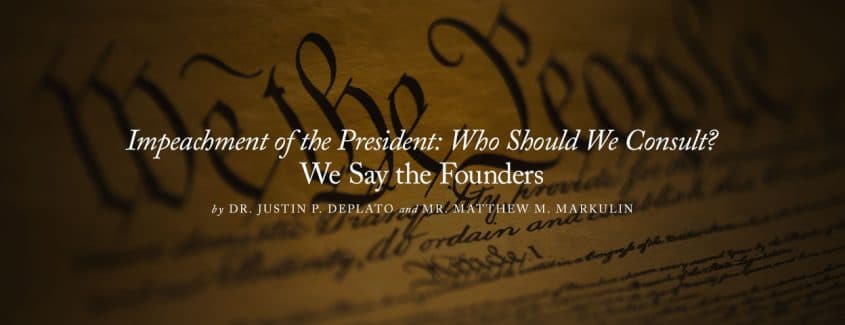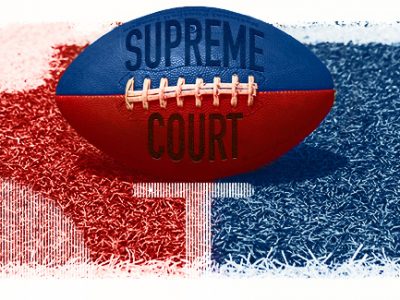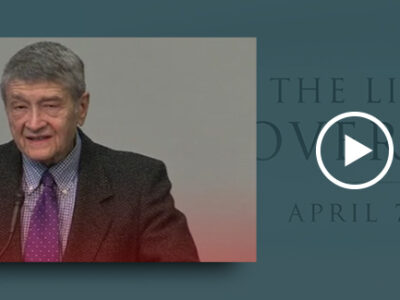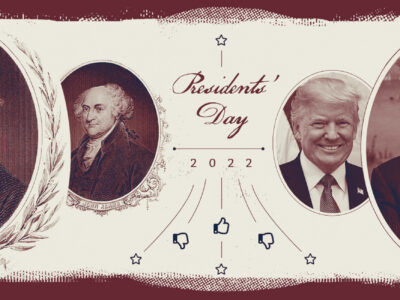
Impeachment was in the news recently after President Donald Trump’s personal attorney, Michael Cohen, pleaded guilty to campaign finance violations. In his plea, Cohen implicated Trump, stating that he, as Trump’s attorney, had made payments to women at the direction of a “candidate for federal office.” Some journalists jumped with joy at the news, as captured by headlines like this in the New York Times: “Donald Trump’s High Crimes and Misdemeanors: The Principled Case for Impeachment is Clear, What is Missing is the Courage.”
Of course, newspapers started predicting Trump’s impeachment even before he took the oath of office. In December 2016, the Chicago Tribune ran a piece with this title, “The Founders provided a Solution to Trump: Impeachment,” and Vanity Fair asked mere days after Trump’s election, “Will Trump be Impeached?”
Now that impeachment is again the subject of headlines, it’s necessary and prudent to understand what impeachment meant to the Founders, as well as the historical usage of congressional impeachment power—rather than rely on the casual observations of journalists and D.C. pundits about the meaning of constitutional impeachment.
Article II, Section 4 of the Constitution states that “The President, Vice President, and all other civil Officers of the United States, shall be removed from Office on impeachment for, and conviction of, Treason, Bribery, or other high Crimes and Misdemeanors.” James Madison and other founders (Alexander Hamilton, James Wilson, Elbridge Gerry, and Edmund Randolph) argued for the addition of an impeachment clause, which followed a strong floor debate. In particular, members disliked the Senate having power to convict the president. Those in favor argued that the threat of elections and waiting until the next election alone would not be enough to check the unbridled power of the executive. In particular, Madison argued that the damage that an abusive president could cause likely would do fatal harm to the republic, and the harm would be irreversible if waiting until the next election; thereby making a removal process of the president necessary.
The framers clearly defined “treason” in Article III, Section 3 of the Constitution, and bribery was generally well defined and understood at the Constitutional Convention. But what did the framers mean by “high Crimes and Misdemeanors?” These terms can cause hyper-partisan debate and devalue intelligent discussion around impeachment.
The history of the inclusion of “high Crimes and Misdemeanors” in the Constitution traces its origins back to the debates that occurred at the Constitutional Convention. Initially, the Committee on Postponed Matters proposed only “treason and bribery” as impeachable offenses. However, George Mason voiced his concern over limiting impeachment to these two offenses. His criticism of the initial impeachable offenses stemmed from his view that by limiting impeachment to only treason and bribery, many greater and dangerous offenses would not be considered impeachable. In order to increase the scope of Congress’ power of impeachment, Mason proposed the addition of “maladministration” as another offense that constitutes impeachment.
Although the inclusion of “maladministration” as an impeachable offense would give greater power to Congress and its check on the president, James Madison voiced concern over the vague nature of the phrase “maladministration.” In order to clear up potential confusion over the meaning of maladministration, Mason added the phrase “other high Crimes and Misdemeanors against the State,” which would later be shortened to “other high Crimes and Misdemeanors.” The exclusion of “against the state” raises further questions over the meaning of “other high Crimes and Misdemeanors,” as it doesn’t narrow the scope of what is considered an impeachable offense, rather broadening it to charges that aren’t strictly considered crimes.
In order to look further into the intended meaning of “other high Crimes and Misdemeanors” and what the framers said regarding impeachment, we must examine The Federalist Papers. In Federalist No. 65, Alexander Hamilton defined impeachable offenses as “those offences which proceed from the misconduct of public men, or, in other words, from the abuse or violation of some public trust. They are of a nature which may with peculiar propriety be denominated political, as they relate chiefly to injuries done immediately to the society itself.” In other words, Hamilton saw the causes and grounds for impeachment as actions causing public harm. Later, in Federalist No. 69, Hamilton stated, “The President of the United States would be liable to be impeached, tried, and upon conviction of treason, bribery, or other high crimes and misdemeanors removed from office; and would AFTERWARD be liable to prosecution and punishment in the ordinary course of law.” Therefore, presidents, according to Hamilton, may not face criminal prosecution while in office.
As a rebuttal to Hamilton, the Anti-Federalists stated, “He [President] is the generalissimo of the nation … he may pardon all offenses, except in cases of impeachment. Will not the exercise of these powers therefore tend either to the establishment of a vile and arbitrary aristocracy or monarchy? The safety of the people in a republic depends on the share or proportion they have in the government.” (Paper No. 66)
At the time of the adoption of the Constitution, the phrase “high crimes and misdemeanors” was well known to the framers, as it was a term used in the British Parliament. Those who were charged with committing “high crimes and misdemeanors” in Parliament were charged both for offenses which were crimes and others which were not. By examining the phrase “high crimes and misdemeanors,” it is apparent that impeachable offenses that fall under this umbrella are considered any actions deemed “high crimes”—all the way down to what may be considered “misdemeanors.”
Throughout history, Congress has impeached 13 judges as well as President Andrew Johnson and President Bill Clinton. The charges brought against the judges ranged from being a drunkard to filing false income tax returns. President Johnson was impeached for “high crimes and misdemeanors” stemming from his dismissal of Edwin Stanton as Secretary of War and his violation of the Tenure of Office Act, as well as disgracing the office of the President of the United States through his words and actions. Interestingly, a future president, John F. Kennedy, in his book, “Profiles in Courage,” would praise Senator Edmund G. Ross for his vote to acquit Johnson, defending Senator Ross, stating that his vote aided in defending the independence of the presidency.
As is evident from the usage of Congress’ impeachment power throughout history, Congress has frequently impeached elected officials for charges that are not considered criminal charges. Rather, these charges were deemed detrimental to the public and the office of the president. Due to the vague nature of the Constitution’s impeachment clause, Congress has the power to impeach an elected official for any reason, as long as it can be deemed a “high crime and misdemeanor.”
Granting Congress such a broad power gives Congress the power to impeach an elected official simply out of partisan disdain, as long as Congress brings about the charges as “other high crimes and misdemeanors.” The historical usage and the framers’ intent of the impeachment clause of the Constitution gives Congress a precedent to impeach President Trump, regardless of whether he has criminal charges brought against him or if his actions do indeed harm the public trust.
We conclude from our examination of documents from the American founding and the Constitutional Convention that there lies a metaphorical bar between “high crimes and misdemeanors,” which means presidents cannot commit illegalities or be prosecuted while in office. This bar also does include “hyper” dislike for a president’s personality and comments. Nonetheless, President Trump will want to do his best to help Republicans keep the House this November; otherwise, he might find himself treading water like President Johnson or President Clinton against a hostile opposition party.




